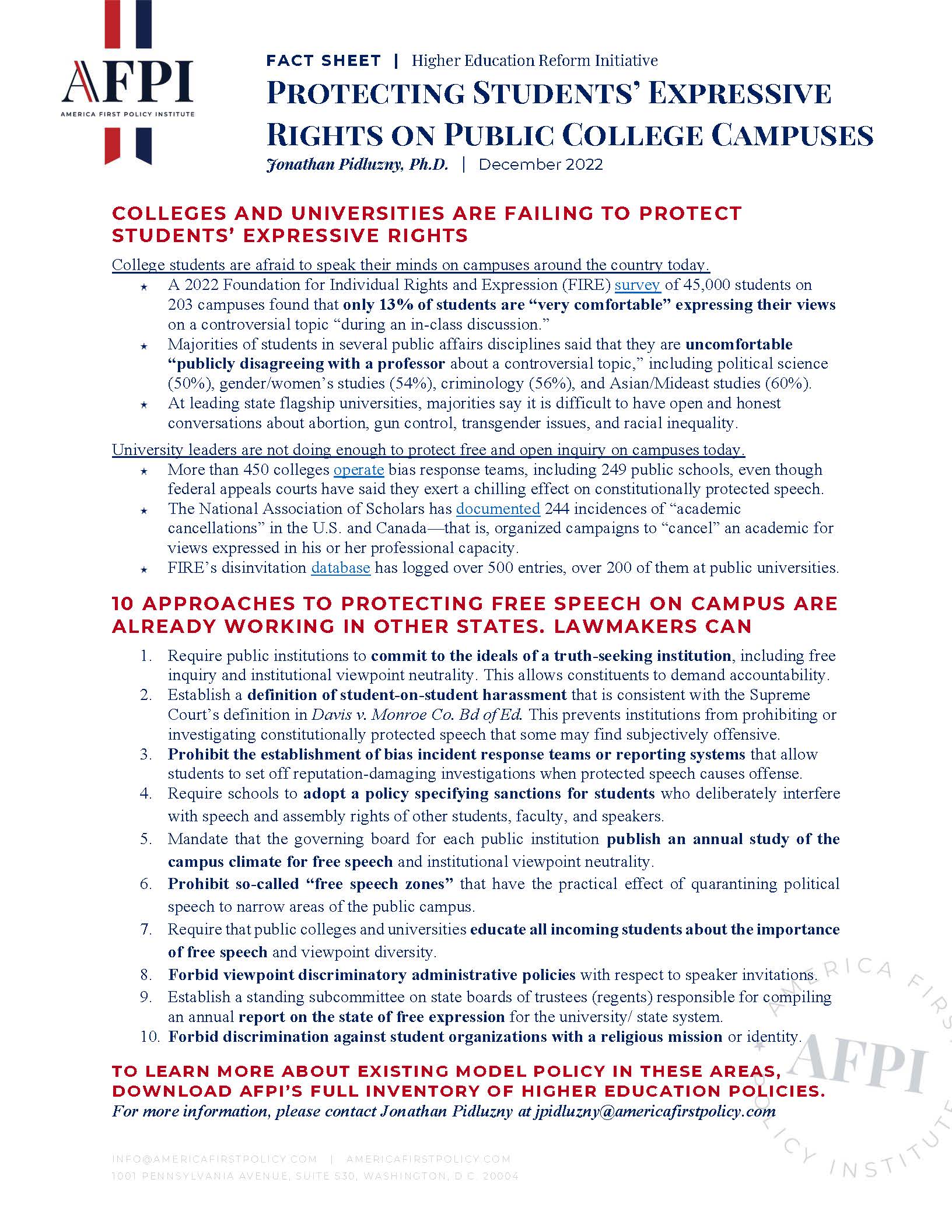Jonathan Pidluzny, Ph.D.,
December 9, 2022
Protecting Students’ Expressive Rights on Public College Campuses
Key Takeaways
College students are afraid to speak their minds on campuses around the country today.
University leaders are not doing enough to protect free and open inquiry on campuses today.
Colleges and universities are failing to protect students’ expressive rights
College students are afraid to speak their minds on campuses around the country today.
- A 2022 Foundation for Individual Rights and Expression (FIRE) survey of 45,000 students on 203 campuses found that only 13% of students are “very comfortable” expressing their views on a controversial topic “during an in-class discussion.”
- Majorities of students in several public affairs disciplines said that they are uncomfortable “publicly disagreeing with a professor about a controversial topic,” including political science (50%), gender/women’s studies (54%), criminology (56%), and Asian/Mideast studies (60%).
- At leading state flagship universities, majorities say it is difficult to have open and honest conversations about abortion, gun control, transgender issues, and racial inequality.
University leaders are not doing enough to protect free and open inquiry on campuses today.
- More than 450 colleges operate bias response teams, including 249 public schools, even though federal appeals courts have said they exert a chilling effect on constitutionally protected speech.
- The National Association of Scholars has documented 244 incidences of “academic cancellations” in the U.S. and Canada—that is, organized campaigns to “cancel” an academic for views expressed in his or her professional capacity.
- FIRE’s disinvitation database has logged over 500 entries, over 200 of them at public universities.
10 approaches to protecting free speech on campus are already working in other states. lawmakers can
- Require public institutions to commit to the ideals of a truth-seeking institution, including free inquiry and institutional viewpoint neutrality. This allows constituents to demand accountability.
- Establish a definition of student-on-student harassment that is consistent with the Supreme Court’s definition in Davis v. Monroe Co. Bd of Ed. This prevents institutions from prohibiting or investigating constitutionally protected speech that some may find subjectively offensive.
- Prohibit the establishment of bias incident response teams or reporting systems that allow students to set off reputation-damaging investigations when protected speech causes offense.
- Require schools to adopt a policy specifying sanctions for students who deliberately interfere with speech and assembly rights of other students, faculty, and speakers.
- Mandate that the governing board for each public institution publish an annual study of the campus climate for free speech and institutional viewpoint neutrality.
- Prohibit so-called “free speech zones” that have the practical effect of quarantining political speech to narrow areas of the public campus.
- Require that public colleges and universities educate all incoming students about the importance of free speech and viewpoint diversity.
- Forbid viewpoint discriminatory administrative policies with respect to speaker invitations.
- Establish a standing subcommittee on state boards of trustees (regents) responsible for compiling an annual report on the state of free expression for the university/ state system.
- Forbid discrimination against student organizations with a religious mission or identity.
For more information, please contact Jonathan Pidluzny at [email protected]
